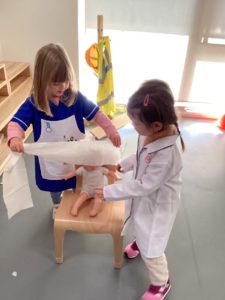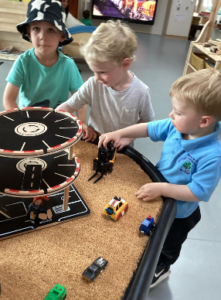
German educationalist Friedrich Froebel suggests that: “Play is the highest expression of human development in childhood, for it alone is the free expression of what is in a child’s soul.”
Play is the work of childhood and at Overlee, we value a developmentally appropriate approach to the curriculum to support children’s learning and development.
Play is a life enhancing daily experience for all children and young people.
Our vision is that all our Overlee children will have accessible and inclusive opportunities to play every day. Access to play experiences indoors and out, offers children the freedom and spaces to learn, explore, interact, create and have fun through play. We believe that play promotes curiosity, skills for life and work and autonomy. Our children thrive through open ended opportunities to explore critical thinking and problem solving skills through a developmentally appropriate approach to the curriculum.
Nursery Tour through the eyes of a child
At Overlee we aim to ensure that all children enjoy new, interesting and exciting play experiences daily. We will build on children’s interests and skills and ensure a balance of adults and children leading the learning. We believe that through interaction with other children, adults, and a stimulating learning environment, children will develop their knowledge, skills and relationships at a pace that is led by them and their stage of development. Through a play based approach, children will explore and make sense of the world around developing their curiosity, creativity and resilience.
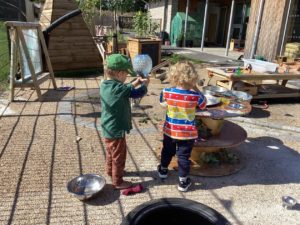
Our curriculum will be designed with our children at the centre. We will utilise evidence gathered through observations to create further opportunities to explore, experiment and follow children’s lines of enquiry. We will plan in the moment with our children, focusing on what is important to them.
Our Child Development Officers (CDOs) and Nursery Teacher (NT) will skilfully interact with children in a way that supports and develops their thinking, encouraging them to find solutions to any challenges they face, or by helping children to see things from a different perspective. Our children will be actively involved throughout the learning process, ensuring that they are able to describe what they are learning, how they are learning and evaluating their play experiences.
We will utilise the skills progression, experiences and outcomes in the Curriculum for Excellence at Early level to underpin our planning and questioning. We will provide lots of opportunities to promote Creativity! Through open-ended resources within all areas of our centre, provocations and points of interest for exploration and discussion. We will strive to ensure children develop their problem solving, flexible thinking and critical thinking skills which are vital to all aspects of learning.
We are really passionate about rich outdoor learning. We aim to provide experiences that allow children to learn in nature, through nature and by nature helping to develop a real sense of awe and wonder about the world. We will provide opportunities for planting and growing, learning about the environment and the weather. This will take place within our garden area, our local woodland area and in the local community. We value risky and adventurous play with loose parts to promote children’s gross motor skills as well as their self-confidence and ability to manage risks.
As a staff team, our practice is underpinned by research, professional reading and professional dialogue. We will continuously evaluate and reflect on our practice and ensure we keep abreast of pertinent research in early years.
At Overlee every day will be a new, exciting learning adventure for both children and adults!
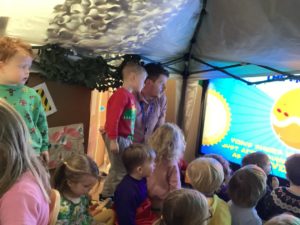
The Importance of play
…play at this time is not trivial, it is highly serious and of deep significance
(Froebel, 1826)

Play is an intrinsic part of human nature and development. For babies and children, the essential role of play is well documented. Through play a child develops their cognitive, social, emotional and physical capacities.
Froebel’s quote above continues to resonate today. Froebel created the concept of the ‘kindergarten’ based on recognising the extent of young children’s abilities and possibilities. He argued that play is the highest form of human development. He advocated that young children need adults who are flexible and responsive to their needs. Adults who both recognise the importance of play and can understand and use their knowledge of the child in which to base their practice.
We know how important it is for children to be given time to play throughout the day to follow their own line of enquiry or individual interest. Play is often thought of as children’s work (Isaacs, 1930) and anyone observing children absorbed in play can see how hard they work.
But play is not simple.
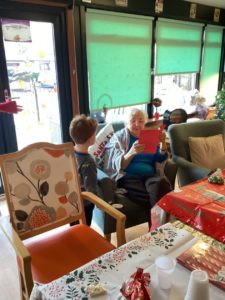
Play can be and mean many different things to children and adults. We may describe activities we plan as ‘play’ whereas a child may not see these as play at all. ‘Play’ is therefore both a tricky word and concept to describe. It can be fun and joyful or difficult and complicated. This is a challenge for us as the act can be misinterpreted as being ‘just play’. The intrinsic value of what a child is actually doing and learning can be missed or ignored and therefore seen as less valuable. We also may consciously or unconsciously place more value on tasks we plan and lead with pre-determined outcomes.
“A partnership between children and adults where children can negotiate input and outcomes serves to increase their autonomy and sense of purpose – potentiating and motivating” (Fisher, 2013)
“Through embracing a negotiated learning environment, through hearing and responding to children’s voices in the design of the environment, an Early Level environment can become a “potentiating” area.” – Claxton and Carr, 2004
‘An effective environment sets the optimum conditions for learning and development’.
Reggio Emilia
